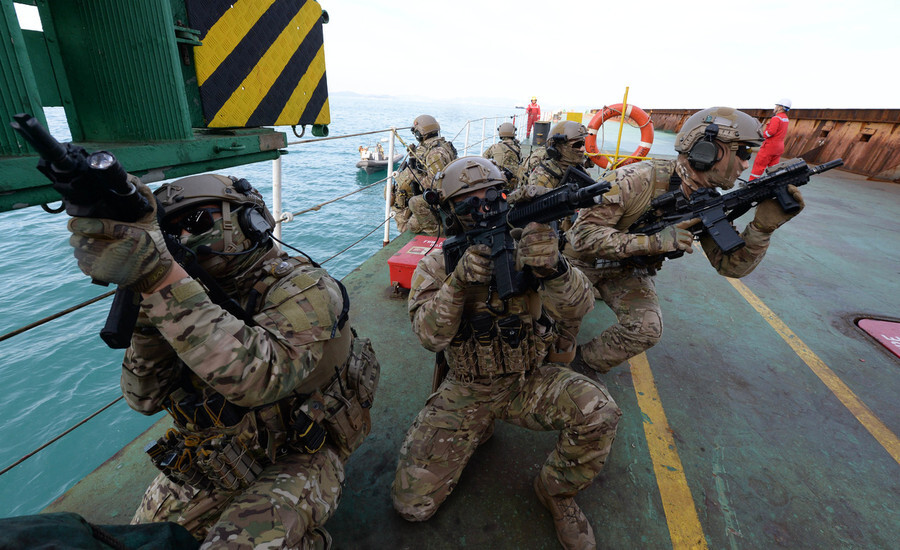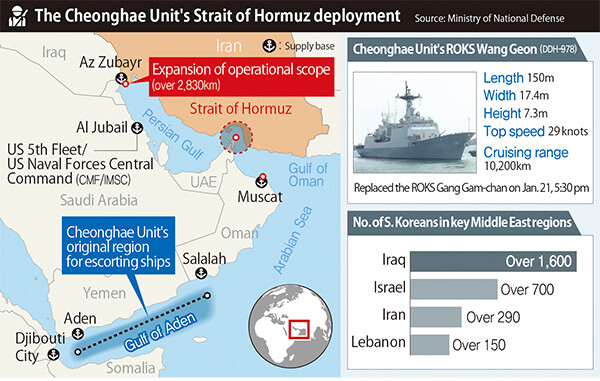hankyoreh
Links to other country sites 다른 나라 사이트 링크
S. Korea to independently deploy Cheonghae Unit to Strait of Hormuz

The South Korean government announced its plans to independently deploy the Cheonghae Unit to the Strait of Hormuz amid rising tensions between the US and Iran. Fearing a diplomatic conflict with Iran, the Blue House announced that South Korea will not be joining a US-led coalition designed to maintain security in the strait formally known as the International Maritime Security Construct (IMSC). Instead, it will be expanding the operational scope of the unit, currently deployed in the Gulf of Aden, by 3.5 times. The deployment of a South Korean combat unit to a conflict area upon the US’ request and without the consent of the National Assembly is proving to be controversial.

South Korea’s Ministry of National Defense (MND) announced on Jan. 21 its decision to “temporarily expand [the unit’s] operational scope in order to safeguard our citizens and secure their freedom of navigation in light of current circumstances in the Middle East.” The MND added that “the unit’s operational scope will be expanded to cover the regions of the Gulf of Aden, the Gulf of Oman, and the Persian Gulf, and the unit will follow orders given by the South Korean military to protect our citizens and vessels.”
The Cheonghae Unit’s current patrol sphere has a diameter of 1,130km, which will be lengthened to 3,966km, a 250% increase. The new operational scope will range from Oman’s Port of Salalah to the Gulf of Oman and the Strait of Hormuz, passing through the Persian Gulf and reaching as far as Iraq’s Khor Al Zubair Port. This expansion took effect immediately after the ROKS Wang Geon, representing the unit’s 31st mission, replaced the ROKS Kang Gam Chan, on its 30th mission, on Jan. 21 at 5:30 pm. The Blue House decided that the current state of heightened tension between the US and Iran in the Strait of Hormuz qualified as “an emergency,” thus necessitating the increase in the unit’s operational scope.
In explaining its decision to deploy troops independently, the MND cited the presence of some 25,000 Korean nationals in the Middle East, the Gulf of Hormuz being an “area of strategic importance,” serving as the route for around 70% of Korea’s oil imports, and that South Korean oil tankers pass through the Strait of Hormuz some 900 times a year. The MND added that “a case of emergency requires a prompt response from our military.”
Unit will also escort foreign vesselsThe MND further explained that, though the unit will carry out missions “independently,” it will cooperate with the US-led IMSC when necessary. A top MND official emphasized that “when independent protection is no longer within the Cheonghae Unit’s own capacity, it will call upon (the IMNC) for assistance.” However, it appears that cooperation will also take place upon request by the US and other IMSC member countries. A deployment consent form submitted by the government to the National Assembly last year stipulates that the unit will “aid the escorting and navigation of foreign vessels.” The military announced its plans to deploy two officers from the unit to IMSC headquarters as “liaison officers” for the purpose of “information sharing and all forms of cooperation.”
MND notified US and Iran before finalizing decisionThe MND said it explained its position to the US and Iran respectively before finalizing its decision to deploy troops. Iran reportedly expressed its objection and concerns regarding foreign military or foreign vessels entering the Strait of Hormuz. A top MND official said that “the US apparently responded to our decision with a warm welcome and excitement for things to come.”
Some non-governmental organizations have criticized the deployment as “unconstitutional, and nothing but a crafty ploy.” “This deployment is an unjustified one,” said Lee Yong-suk, an activist at Seoul-based NGO World Without War. “The government resorted to using a crafty ploy of changing the Cheonghae Unit’s operational scope without the consent of the National Assembly.”
By Noh Ji-won and Bae Ji-hyun, staff reporters
Please direct comments or questions to [english@hani.co.kr]

Editorial・opinion
![[Editorial] Intensifying US-China rivalry means Seoul must address uncertainty with Beijing sooner than later [Editorial] Intensifying US-China rivalry means Seoul must address uncertainty with Beijing sooner than later](https://flexible.img.hani.co.kr/flexible/normal/500/300/imgdb/original/2024/0517/8117159322045222.jpg) [Editorial] Intensifying US-China rivalry means Seoul must address uncertainty with Beijing sooner than later
[Editorial] Intensifying US-China rivalry means Seoul must address uncertainty with Beijing sooner than later![[Column] When ‘fairness’ means hate and violence [Column] When ‘fairness’ means hate and violence](https://flexible.img.hani.co.kr/flexible/normal/500/300/imgdb/original/2024/0516/7417158465908824.jpg) [Column] When ‘fairness’ means hate and violence
[Column] When ‘fairness’ means hate and violence- [Editorial] Yoon must stop abusing authority to shield himself from investigation
- [Column] US troop withdrawal from Korea could be the Acheson Line all over
- [Column] How to win back readers who’ve turned to YouTube for news
- [Column] Welcome to the president’s pity party
- [Editorial] Korea must respond firmly to Japan’s attempt to usurp Line
- [Editorial] Transfers of prosecutors investigating Korea’s first lady send chilling message
- [Column] Will Seoul’s ties with Moscow really recover on their own?
- [Column] Samsung’s ‘lost decade’ and Lee Jae-yong’s mismatched chopsticks
Most viewed articles
- 1Celine Song says she’s gratified global audiences have responded to the kismet of ‘inyeon’
- 2[Editorial] Transfers of prosecutors investigating Korea’s first lady send chilling message
- 3[Exclusive] Unearthed memo suggests Gwangju Uprising missing may have been cremated
- 4For new generation of Chinese artists, discontent is disobedience
- 5[Column] US troop withdrawal from Korea could be the Acheson Line all over
- 6Xi, Putin ‘oppose acts of military intimidation’ against N. Korea by US in joint statement
- 7Highly educated high-earners at risk of being replaced by AI, BOK study says
- 8Japan begins dumping irradiated Fukushima water amid outpouring of concern about vague timeline
- 9USFK sprayed defoliant from 1955 to 1995, new testimony suggests
- 10Four unionists arrested for protesting Fukushima dumping atop King Sejong statue